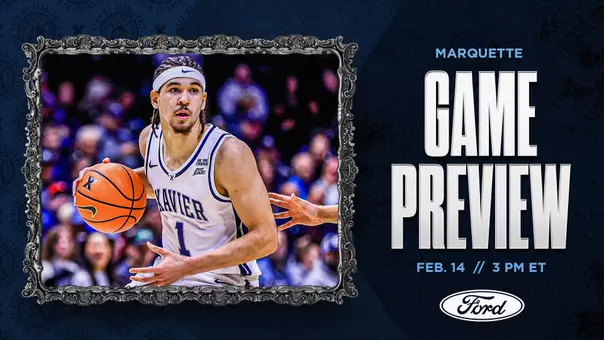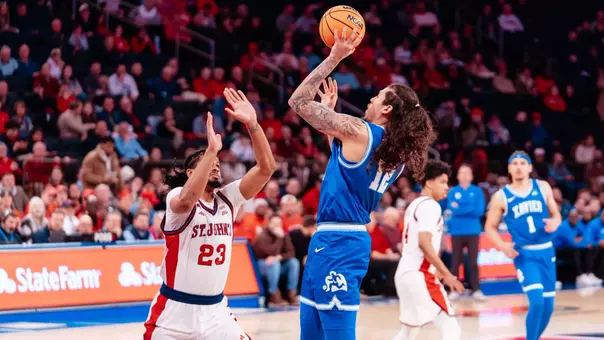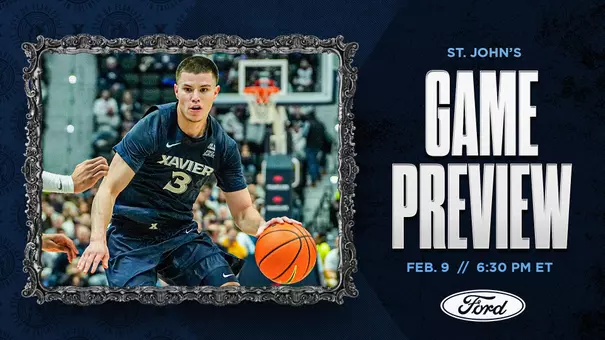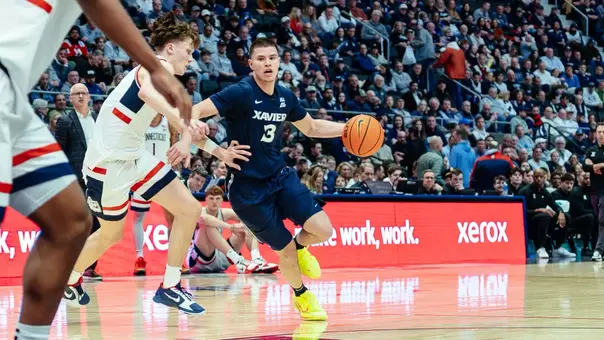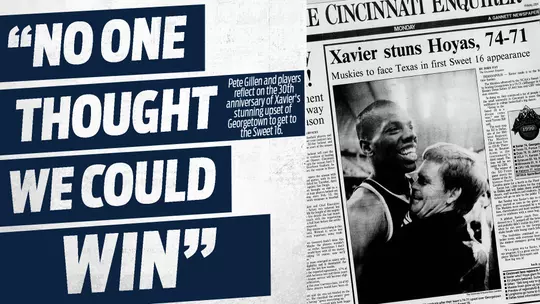
Xavier Nation Magazine Feature: "No One Thought We Could Win"
Pete Gillen and players reflect on the 30th anniversary of Xavier's stunning upset of Georgetown to get to the Sweet 16
Adam Baum, Xavier Nation Magazine
1/22/2020
It was the night before arguably the biggest basketball game in Xavier University history and Jamie Gladden couldn’t sleep. “Every single year when March Madness starts, that game’s the first thing I think about,” says Gladden, a freshman for the Musketeers back in 1989–1990. “When Xavier gets to the Sweet 16, I feel like I’m ready to play. Thirty years went by really fast, but for me it still feels like yesterday.”
Insomnia was a product of what awaited the following day, a Sunday, inside the RCA Dome in Indianapolis. Xavier, a six seed, was making its fifth consecutive NCAA Tournament appearance, and two days earlier the Musketeers had won only the second NCAA Tournament game in school history, beating Kansas State 87–79 in the first round of the 1990 tournament.
“THEY’D NEVER HEARD OF XAVIER”
The next test was No. 3 Georgetown, a program that had won a national championship (1984) and was fresh off its seventh Elite Eight appearance the season prior. Conversely, Xavier had only made the tournament seven times in program history. The Hoyas, led by legendary coach John Thompson Jr., had two future NBA stars in Alonzo Mourning and Dikembe Mutombo, not to mention a solid pair of senior guards in Mark Tillmon and Dwayne Bryant.
“Georgetown was a BIG EAST giant, and I’m coming from New York and everyone wanted to play against them,” says Jamal Walker, a junior point guard that year for the Musketeers. “They had a following that was unbelievable. I remember the open practice before the game and people were just waiting to watch Alonzo and Dikembe work out, then we came in after them and we’re stumbling, falling, getting laughed at. It was funny, but I always knew we were gonna go at them.”
At the time, Georgetown was a perennial powerhouse and didn’t mind acting like it. “They’d never heard of Xavier,” says Pete Gillen, Xavier’s head coach from 1985 to 1994. “They didn’t know where we were from. Before the game, they were saying, ‘Where is Xavier?’ They were asking our players, ‘Are you guys from New Jersey or Connecticut?’ Our guys were ticked. They knew after the game where we were located.”
Walker, who Xavier fans still affectionately refer to as “Jumpin’ Jamal,” says, “Nobody knew who we were. I think when Georgetown was there, the open practice was packed, and then once we came on everyone was leaving. That was good. That just put fuel in the fire.”
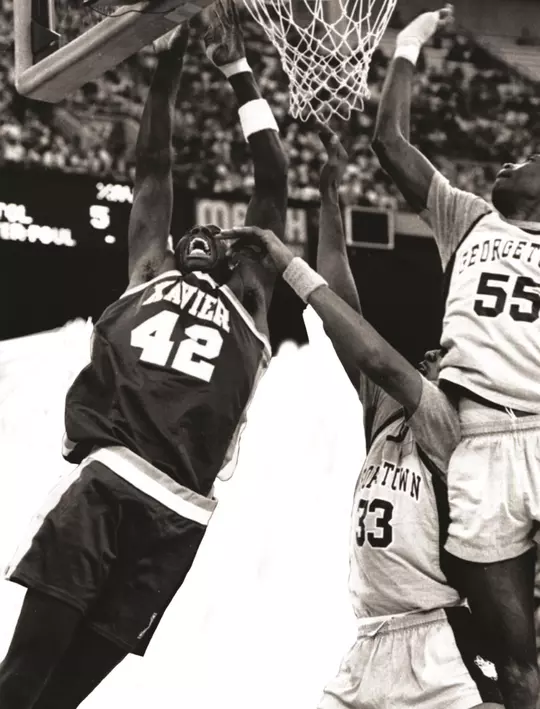
“WE BELIEVED WE COULD DO IT”
Confidence is a curious thing, and for a program that had never made it to the second weekend of the tournament, Xavier believed.
“I will tell you, we had no soft guys on our team,” says Michael Davenport, a junior guard at the time. “Jamal didn’t take any crap. I absolutely didn’t take any crap. Tyrone [Hill] and Derek [Strong] didn’t take any crap. It was like, ‘Bring it, you might be from Georgetown, but we got something for you.’
“I coached for a couple years at West Point, at Xavier for a year. I’ve been around team sports all my life and to have as many strong leaders as we had on that team was really unique. All of us wanted to take that last shot. You rarely find five guys on a team who are like that. We were a balanced team and a tough team. We didn’t take anything from anybody.”
Davenport says that the night before the game, “The coaching staff made a lowlight tape of Georgetown, like a blooper reel video…and I remember us thinking we were gonna win. At that point, we had an extreme amount of confidence knowing that Tyrone and Derek were unique big men. They could rebound, outlet the ball, and then dunk at the other end. I think Alonzo Mourning could do that, but Dikembe was not that type of big man so we did not think they could run with us.”
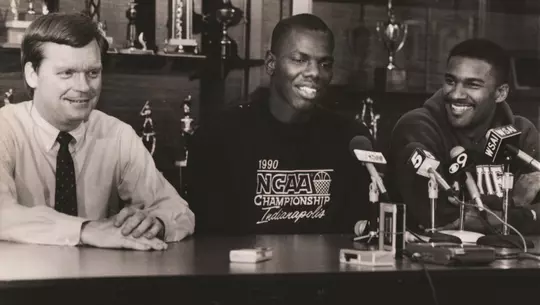
Twenty minutes into the game, it was clear Xavier wasn’t intimidated. The Musketeers led 42–26 at the half. “We were up 16 at the half, and our kids were fired up,” Gillen says. “I gave them some type of speech, hell and brimstone and fire, spitting cotton. I’ll fight coach Thompson if I have to with a bat and he’ll probably kill me, but I gave them a speech and our kids played with fire.
“Up 16 at the half and then I started coaching, and we only won by three. Maybe I should have shut up and just let them play,” he says, laughing.
“You knew they were gonna make a run,” Walker says. “Our biggest thing was to maintain and hold onto it. We struggled in the second half. I know I did. I was tired as hell. Georgetown was relentless. Full-court press and me being from the east coast, I gotta dribble through everybody. Now I know better, pass the ball up the court and make it easier on yourself.”
Ahead of his time with his end-of- game philosophy, Gillen had the Musketeers foul with the lead in the final minute. “We fouled at the end, which I’ve been doing for 20 years as a head coach,” he says. “We fouled up three with 15 seconds left so they didn’t hit a three, and we did that twice in the last 15 seconds, with maybe 11 seconds left and then again with four seconds to go.”
Walker, who hit a pair of foul shots in the closing seconds to help Xavier hang on 74–71, says the crowd was unforgettable that day. Fans came from all over, many to see the Hoyas, but what they ended up seeing was history: the first-ever Sweet 16 appearance in Xavier history.
“I think for some of us it sank in right away, but for me it didn’t,” Gladden says. “It took days before I realized what actually happened. I had family members, friends from back home, everyone I knew watched that game.”
When the bus arrived back at the hotel, the team was greeted by a mob of Xavier fans. “I think it was the Embassy Suites and everyone was hanging over the banisters when we got there,” Walker says. “It was unbelievable. You really thought you had won an NCAA championship, but we had just won a game.”
“THAT WAS ONE OF THE BEST TEAMS I’VE EVER COACHED”
For any program to progress, at some point a team needs to take the next step. The 1989–1990 Musketeers broke down the door that had been holding them back, and in the process, gave confidence to the teams that followed. “It was a special team,” Gillen says. “I had one at Providence that went to the Elite Eight in 1997...Those are the two best teams I coached.”
Xavier had three future NBA players on the roster. Hill, Xavier’s all-time leading rebounder, and Strong were seniors and they both heard their names called a few months later in the NBA draft. Hill went eleventh overall to Golden State, becoming the first lottery pick in Xavier history, and Strong went in the second round to Philadelphia. They played a combined 23 seasons in the NBA. Aaron Williams, a freshman who came off the bench that year, went undrafted but eventually worked his way into the NBA, where he played from 1993 to 2008.
“I thought we’d have a good team, but I didn’t dream that we’d make the Sweet 16,” Gillen says. “I didn’t think that far ahead. Some scouts were saying to me that our two big men, Tyrone and Derek, were the best tandem in the country. Jamal was a terrific point guard. Jamie was a nice combo guard. Michael was a great shooter. Maurice Brantley was a talented wing, and Aaron Williams was a very good player. It was a special team and a special moment...special because no one thought we could win.”
This college basketball season marks the 30th anniversary of that team and Xavier’s first Sweet 16 appearance. In the years since, Xavier has made 21 NCAA Tournaments with seven more trips to the Sweet 16 and three Elite Eight appearances.
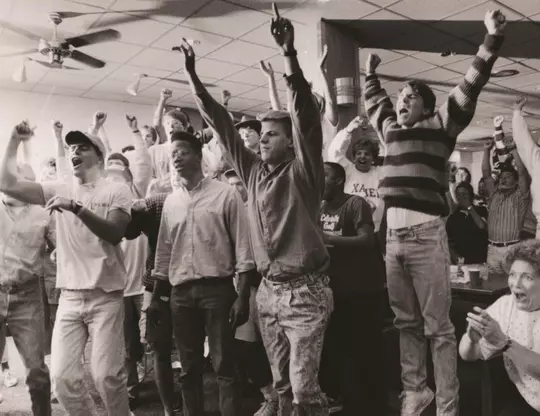
“The biggest challenge was to make them believe we belonged,” Gillen says. “We were like the little engine that could, and we finally believed we could do it. That was a dream season, and the dream continues at Xavier.”
Davenport laughs when reminded it was 30 years ago. “I just turned 50 years old,” he says. “We’re talking 30 years. It’s crazy. I don’t feel old. I talk to my kids about life and how things are. I’ve been a non-athlete longer than I was an athlete. My perspective and my appreciation of what we were able to accomplish and what we did is way different now with my adult lens than it was with my young adult lens. “As I pull away from that as a 50-year-old man working 50 to 55 hours a week, thinking about what we had as 15 guys, what we had as a coaching staff, and what we were able to accomplish together is really special.”
Thirty years ago, Xavier was an unknown, scratching and clawing to be relevant. Today, the Musketeers are a national brand, thanks in part to what happened three decades ago.
“The high schools that I work at, there are a lot of students who know what Xavier is,” says Gladden, who now lives in Atlanta. “When I was a freshman at Xavier, we could go places and people wouldn’t know who we were. Now we’re known all across the country. It really amazes me when I see students walking the halls with Xavier gear on. They’re extra excited to find out I actually played there.”
Gillen has always been quick to credit his predecessor, Bob Staak, for Xavier’s emergence onto the national scene. Staak took over Xavier’s program in 1979, and his first three teams went a combined 28– 54. But in 1982–1983, the Musketeers went 22–8 and to their second NCAA Tournament—and first in 22 years.
Gillen says that without Staak’s success before leaving to become coach at Wake Forest, he might not have taken the Xavier job in 1985. “The guy who started it was Bob Staak,” he says. “We took the quantum leap, but...he was the guy that took the first step, then we took the next big step.”

